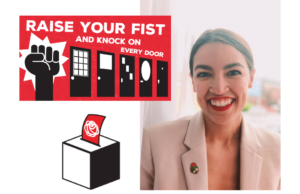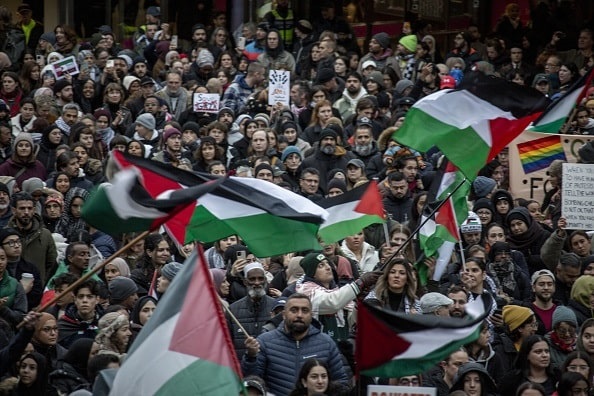The American public was largely caught off guard when pockets of pro-Palestinian protests erupted across the United States following the surprise October attack on Israel. Bearing in mind that more than three-quarters of US citizens polled consider themselves pro-Israel, it was unnerving to see so many well-organized Palestinian voices spring up with such speed. These made-for-TV events were not organic – the printed signs with messages from sponsoring organizations made that evident. So, who are these pro-Palestinian groups spreading anti-Israel messages?

At the top of the list lies the Democratic Socialists of America (DSA). They self-describe as “the largest socialist organization in the United States, with over 92,000 members and chapters in all 50 states.” As the word socialism would indicate, the DSA claims to take up the cause of working people. Since the people who live in Israel work, it’s a bit murky as to why this group is championing the cause of Hamas. Perhaps the point is simply to generate unrest through its campus and community-based chapters. (As a side note, a broad-smiling Rep. Alexandria Ocasio-Cortez (D-NY) is a featured picture on the DSA homepage.)
New York Rep. Ritchie Torres (D) openly seethed about the New York Chapter of the DSA on the social media platform X: “The NYC-DSA is revealing itself for what it truly is: an antisemitic stain on the soul of America’s largest city. There is a special place in hell for those who glorify the cold-blooded murder of civilians and children.”
Primary Organizers of Pro-Palestinian Protests
Another organization printed as a sponsor on pro-Palestinian rally posters is the A.N.S.W.E.R Coalition. The “about us” tab on its website explains its central mission: “Founded just three days after the September 11, 2001 attacks, ANSWER (Act Now to Stop War and End Racism) initiated the massive U.S. antiwar movement opposing the U.S. invasion of Iraq …”
The coalition openly supports the “Palestinian struggle for self-determination.” It has mobilized its people “to stop the repeated assaults against and massacres of the people of Gaza.” The Anti-Defamation League (ADL) also identified the Palestinian Youth Movement, Students for Justice in Palestine, and the US Palestinian Community Network as three other prominent players in the anti-Israel rallies occurring across the country.
In terms of making a big splash for the TV news crews, the winner of this prize goes to the Jewish Voice for Peace (JVP). Last Wednesday, October 18, it marshaled thousands of supporters to protest in Washington, DC, and held a sit-in inside the rotunda of the Cannon Office Building on Capitol Hill. It was joined by another anti-war group called IfNotNow; these organizations come to the pro-Palestinian protests by way of their Jewish heritage, advocating for a peaceful resolution to the Israeli-Palestinian conflict.
The Jewish Voice for Peace pacifist rally concluded with the arrest of 355 activists. The Anti-Defamation League has a few choice words for the JVP, calling it “a radical anti-Israel and anti-Zionist activist group that advocates for the boycott of Israel and eradication of Zionism.” It continues, “The spread of JVP’s most inflammatory ideas can help give rise to antisemitism, and sometimes it has espoused classic antisemitic tropes itself.”
Then there is the Palestinian Youth Movement (PYM) which has chapters all over North America, including Canada. The ADL categorizes it as “an anti-Zionist activist organization” that “frequently engages in inflammatory rhetoric about Zionism, including calls to stigmatize and ban Zionists from community spaces.”
The deeper one digs, the easier it is to see that the pro-Palestinian protests were not events that sprang up coincidentally or organically but had been orchestrated by well-oiled anti-Israel or pro-Muslim groups who were at the ready before the blood dried following the Hamas attack on innocent Israeli people. So whether these folks hold a sit-in on Capitol Hill or disrupt commerce and tourism in Times Square, it’s vital to note these are fringe groups of people and do not represent the majority opinion of US citizens.




